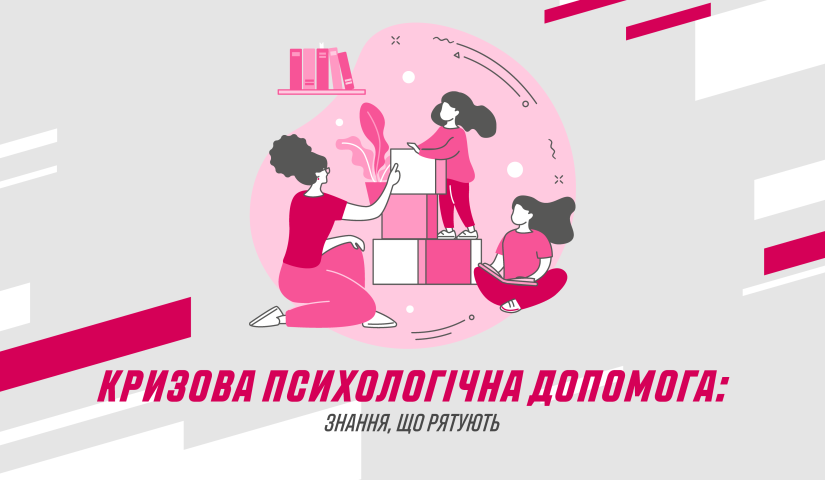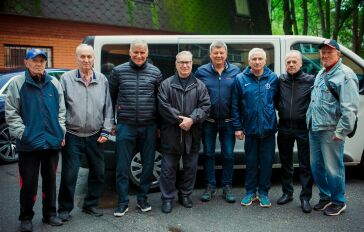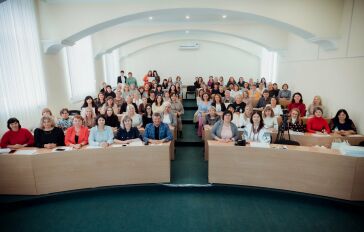
The international charitable organization Parimatch Foundation continues to implement psychological rehabilitation strategic program for children and adults affected by the war — Mental Health — as a part of which the Foundation, together with the Israeli trauma coalition, launched an educational project for ICR psychologists in Ternopil, Lviv, Ivano-Frankivsk, and Chernivtsi regions. In total, almost 150 specialists, working both with internally displaced persons who found refuge in the West of Ukraine and with residents, completed the «Psychological Support in Crisis» course.
In particular, 29 ICR psychologists of the Ternopil region, the first region where the course was launched, completed the course, and actively use the knowledge when working with those affected by the war in Ukraine. Specialists talk about the main problems they bumped into and share their experiences of working with IDPs.

It is to be noted that the Ternopil region sheltered hundreds of families who witnessed war. Some of them lost relatives, friends, jobs, documents, and homes. When fleeing with various difficulties, and adapting to a new place, the displaced people experience many social, economic, and psychological problems. That is why the work of a psychologist becomes the key aspect in the mental recovery of people and helps them to adapt faster to a new place. Children need help even more because they are more vulnerable and sensitive to the influence of adverse environmental factors than adults.
Since the beginning of the war, centers of psychological assistance have been operating in the Ternopil, where IDPs are provided with consultations, as well as hold individual conversations with parents and their children about finishing school, and work with toddlers using the “House-Tree-People” method. In addition, preventive group discussions with children of different age categories are regularly held here, and children and their parents are involved in city activities.

— We learned to live as one big, friendly family, where strangers come to help each other, — says psychologist of the Koziv community Khrystyna Dyachenko. After completing the training, I try to use the new knowledge at work. People from hot spots come to us and they need support and comfort. We do our best to help them. Children usually have increased tearfulness and capriciousness, frequent mood swings, problems related to communication, fear, and mistrust or aggression. Here the task is to find possible options for optimal development (creating a safe and favorable situation for the child’s development through work with all family members, providing stimulating social contacts and opportunities to reveal his abilities).
At first, IDPs were reluctant to make contact, but we get to know each other better and they understand that they can share their experiences. We found out that each person experiences different moods during the war, from anxiety, and depression to resilience and courage. They suffer memory impairment and inattention, forgetfulness, and change of life principles and plans for the future. The behavior of IDPs is marked by unpredictability and illogicality of actions, excessive disinhibition, and unmotivated vigilance.
However, gradually people began to self-organize, volunteer, and help others. Work, hobbies, and household also help them survive stressful situations.
We talked a lot about the post-traumatic syndrome, which many people have. Some of them feel even worse than before the forced relocation even if there is no longer an acute threat to life: people feel fear, cannot get rid of traumatic memories, etc. We work with such people and try to achieve mental balance with them and strengthen their physical and moral condition, — shares Khrystyna Dyachenko.

The greatest progress was made by those who received timely help.
The psychologist of the shelter organized in the dormitory of college #4 named after M. Paraschuka Olena Kravets notes that if adults talk about their experiences, children do not want to talk about it. This is where art therapy comes to the rescue. Children transfer their negative emotions to art and that is the way they share the negativity and can get rid of these emotions.
— Both children and adults have difficulties with trust, they perceive others warily. That’s why I work on establishing open, friendly, and honest relationships to be effective, — says the psychologist.
Specialists note that the greatest progress was achieved by those who received timely help. Such people have emotional stability and reduced anxiety. Parents have the resource to work again, children start studying remotely.
Specialists respond positively to the «Psychological Support in Crisis» course initiated by the Parimatch Foundation together with the Israeli Trauma Coalition and admit that it helped them find the right methods for working with those affected by the war.
— Thanks to the course, I learned about new techniques and means of interaction with parents and children. It turned out that it is much easier to work with toddlers than with children – they are more open to communication. It was easy to establish contact with the parents. Exercises with visualization were more difficult for them. The technique worked well where it was necessary to build a safe place. I am sincerely grateful to the Parimatch Foundation for the opportunity to work and study, — says Olena Abukhazhar, a psychologist of Secondary School No. 26 named after Dmytro Zaplitny in Ternopil.
Tatyana Bodnar, a school psychologist from Ternopil, adds that all the techniques she was taught in the course are effective:
— All training techniques by experts of the Israeli Trauma Coalition are effective. Trainers have selected exercises that are easy to use and do not require additional preparation, which is very important in work that requires immediate action and results. I often used the BASIC PH multimodal technique (identification of overcoming strategies) in my work, this technique was the most effective especially in the first months of the war.

Parimatch Foundation plans to launch the «Psychological Support in Crisis» course in all regions of Ukraine, as the knowledge gained will enable IRC psychologists to provide quick and high-quality assistance to internally displaced persons.
The Foundation declares that, by joint efforts, they are trying to bring back to the people affected by the war the faith in themselves, in the future, and Ukraine!






